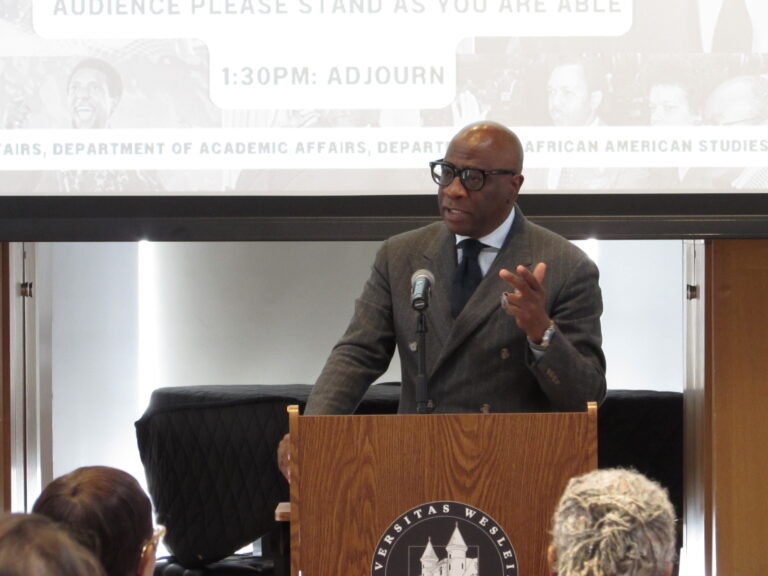Students trap Bennet in office, demand to be heard
While President Doug Bennet stayed locked in his South College office, over 250 students gathered outside the building and later blocked the stairwells to protest a long list of issues related to a lack of student voice in recent Administration decisions. Standing for over four hours in the rain, students spoke out on an open mic and tried to bargain with Bennet to address their concerns with the whole community.
The students presented a 16-item issue list that included the WESU/WSHU deal, chalking, gender-neutral housing, hate crimes, and ethnic studies. Organizers passed out fliers titled “Open Letter to the Wesleyan Community,” which explained these concerns.
The letter states that, “the issues presented below are striking examples of the lack of Administration accountability and the absence of student voice in decision-making processes at Wesleyan.”
Bennet, with the help of Director of Public Safety Maryann Wiggin, tried to leave his office a couple of times during the afternoon, once to attend a faculty meeting. He was unable to leave, however, when students blocked his path.
“At that juncture there were so many students in the stairwell we had to lock our door because they were trying to come in here,” said Justin Harmon, Director of University Communications. “They were stomping their feet very loudly and yelling and creating a disruption that basically went on the rest of the afternoon.”
According to Harmon, Bennet was initially reluctant to address the students’ demands of issuing a statement to the whole campus, announcing a forum, praising the protest as productive and promising substantial results.
“The goal [of Tuesday] was to get President Bennet to engage with our dissatisfaction with University policies on our terms,” said Matt Montesano ’05, who actively participated in the protests. “Yeah, it was intimidating, but no one was going to hurt Doug Bennet.”
Nell Schaffer ’06 said that the issues listed reflect problems that have not been addressed by the Administration for a long time.
“I’m frustrated with how the Administration is not responding to a number of issues,” Schaffer said. “The whole point of the school is having it for the students. It’s ridiculous that when my sister was here, who graduated in 2000, they were dealing with the same exact issues.”
To draw attention to the growing crowd outside South College, some students ran through Fisk and PAC interrupting classes in the process.
“I definitely supported what they did, but if there’s one thing we should maintain it’s our relationship with our professors,” said Anjali Saxena ’06, who was in Professor of Philosophy Joseph Rouse’s class, which was interrupted.
After the protesters walked in on Rouse’s class, Saxena said that Rouse told them that they were taking away his voice also.
According to Anay Shah ’05, a number of students, including Shah, left at the end of their economics class in PAC 004 to attend the protest. Shah said he stayed at the protest until the count-off around 3 p.m. At that point about 275 students had congregated.
“It was pretty awesome because it was all spontaneous,” Shah said. “It’s great because it was student led. The people leading it took it upon themselves to motivate and control the crowd, and they’re still respected.”
Students tried to communicate with Bennet in his office to get him to agree to hold a campus meeting on Wednesday and to send an e-mail to the Wesleyan community addressing the issues.
“I was really impressed with the unity created by the organizers,” Schaffer said. “Getting the e-mail written while doing it in a civil manner was really impressive.”
Bennet left his office at 5 p.m. after he and students agreed to meet on Wednesday.
“At this point, I’m optimistic about making change,” Shaffer said. “We showed them in numbers and in words that this is something they need to pay attention too…Maybe not everything can be changed, but for me a victory on one issue would be a victory for all of them.”
Tuesday’s protest was sparked by a speak-out on Monday, which was organized to address issues related to students of color on campus. The open mic event was held in front of the Campus Center from noon to 1:30 p.m.
According to Delilah Lora ’05, an organizer of Monday’s speak-out and a member of Ajua Campos, a campus Latino awareness group, the event was organized partly in response to the lack of University support in trying to bring Guillermo Gomez Penya to campus for a keynote address during Latino Awareness Month. Penya, described as a political revolutionary activist, had to cancel at the last minute due to funding, according to Lora.
“I felt that it was a good opportunity for students to speak to students about what’s going on on campus, especially about student of color issues,” said Jillian White ’08, who also said that students of color were speaking more to each other than addressing the campus.
White spoke out about Native American issues on campus, criticizing the lack of options for multiracial students for defining themselves at the University.
“It’s problematic because they are denying students part of their identity,” White said.
White participated in the speak-out as a member of NEXUS, a new campus group for students of color involved in activism. According to White, the student audience at the speak-out was receptive and continued to listen despite the snow and cold weather.
“I think the speak-out was effective for giving students of color the agency for having their voices heard,” White said.
The events on Monday and Tuesday were part of a week-long organized protest which included an open community forum on Wednesday afternoon and a talk by Amy Goodman from Democracy Now scheduled for Friday evening.







Leave a Reply